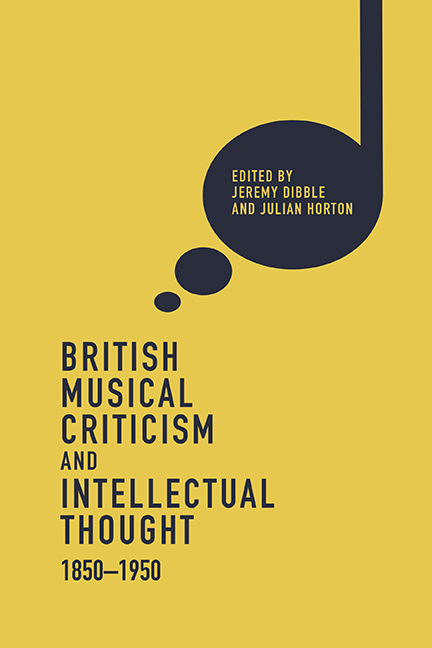Book contents
- Frontmatter
- Dedication
- Contents
- List of Illustrations
- List of Contributors
- Acknowledgements
- Introduction: Trends in British Musical Thought, 1850–1950
- 1 Avoiding ‘Coarse Invective’ and ‘Unseemly Vehemence’: English Music Criticism, 1850–1870
- 2 Spencer, Sympathy and the Oxford School of Music Criticism
- 3 Free Thought and the Musician: Ernest Walker, the ‘English Hanslick’
- 4 Ernest Newman and the Promise of Method in Biography, Criticism and History
- 5 ‘Making Symphony Articulate’: Bernard Shaw's Sense of Music History
- 6 Analysis and Value Judgement: Schumann, Bruckner and Tovey's Essays in Musical Analysis
- 7 The Scholar as Critic: Edward J. Dent
- 8 Russia and Eastern Europe
- 9 Anti-Intellectualism and the Rhetoric of ‘National Character’ in Music: The Vulgarity of Over-Refinement
- 10 Chosen Causes: Writings on Music by Bernard van Dieren, Peter Warlock and Cecil Gray
- 11 ‘Es klang so alt und war doch so neu’: Vaughan Williams, Aesthetics and History
- 12 Constant Lambert: A Critic for Today? A Commentary on Music Ho!
- 13 The Challenge to Goodwill: Herbert Howells, Alban Berg and ‘The Modern Problem’
- 14 Hans Keller: The Making of an ‘Anti-Critic’
- Select Bibliography
- Index
- Titles listed here were originally published
2 - Spencer, Sympathy and the Oxford School of Music Criticism
Published online by Cambridge University Press: 17 July 2019
- Frontmatter
- Dedication
- Contents
- List of Illustrations
- List of Contributors
- Acknowledgements
- Introduction: Trends in British Musical Thought, 1850–1950
- 1 Avoiding ‘Coarse Invective’ and ‘Unseemly Vehemence’: English Music Criticism, 1850–1870
- 2 Spencer, Sympathy and the Oxford School of Music Criticism
- 3 Free Thought and the Musician: Ernest Walker, the ‘English Hanslick’
- 4 Ernest Newman and the Promise of Method in Biography, Criticism and History
- 5 ‘Making Symphony Articulate’: Bernard Shaw's Sense of Music History
- 6 Analysis and Value Judgement: Schumann, Bruckner and Tovey's Essays in Musical Analysis
- 7 The Scholar as Critic: Edward J. Dent
- 8 Russia and Eastern Europe
- 9 Anti-Intellectualism and the Rhetoric of ‘National Character’ in Music: The Vulgarity of Over-Refinement
- 10 Chosen Causes: Writings on Music by Bernard van Dieren, Peter Warlock and Cecil Gray
- 11 ‘Es klang so alt und war doch so neu’: Vaughan Williams, Aesthetics and History
- 12 Constant Lambert: A Critic for Today? A Commentary on Music Ho!
- 13 The Challenge to Goodwill: Herbert Howells, Alban Berg and ‘The Modern Problem’
- 14 Hans Keller: The Making of an ‘Anti-Critic’
- Select Bibliography
- Index
- Titles listed here were originally published
Summary
Introduction
Musical critics often give applause to compositions as being “scientific” – as being meritorious not in respect of the emotions they arouse but as appealing to the cultured intelligence of the musician … I hold these to be perverted beliefs having their roots in the prevailing enormous error respecting the constitution of mind. In that part of life concerned with music, as in other parts of life, the intellect is the minister and the emotions the things ministered to.
STRONG words coming from a self-confessed, rank musical amateur. From anyone else they might be dismissed as the mad ravings of a lunatic. Coming from a Victorian intellectual titan and author of one the first evolutionary studies of musical origins, however, Herbert Spencer's words carried a great weight of authority.
Public intellectual and serial controversialist, Spencer (1820–1903) came from a relatively unmusical family and was unable to play an instrument, but he clearly enjoyed music and from the late 1840s he regularly attended opera and concerts in London. Around the same time he began learning how to sing from Hullah's famous singing manual, and although his interest remained more intellectual than practical he retained a love of singing by the piano, later chiding his close friend (and possibly lover) the novelist George Eliot for never joining in. Recent work on Spencer reflects an interest in his work-a-day musicality – portraying him as an amateur in the strictest sense, and as a true, ardent lover of music – but most work on Spencer and music tends to focus almost exclusively on his evolutionary theory, and there is practically nothing on his musical criticism. As John Offer, Charles Brotman and I suggest, so deeply interwoven is evolution within his philosophical programme as a whole that it is difficult, nearly impossible, to disaggregate it from other elements of his thought, especially his music criticism.
To do that requires more than simply disentangling the strands in Spencer's evolutionary thinking; rather, it requires an examination of their relationship to a curiously neglected musicological topic – sympathy. For Spencer and his philosophical descendants in the Oxford School of music criticism, sympathy is at the root of human advancement. At the root of sympathy, however, is music; musical feelings, Spencer opines, ‘are the chief media of sympathy’.
- Type
- Chapter
- Information
- Publisher: Boydell & BrewerPrint publication year: 2018



